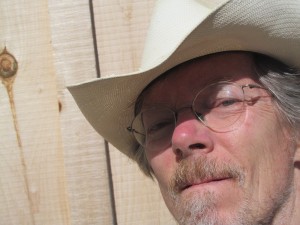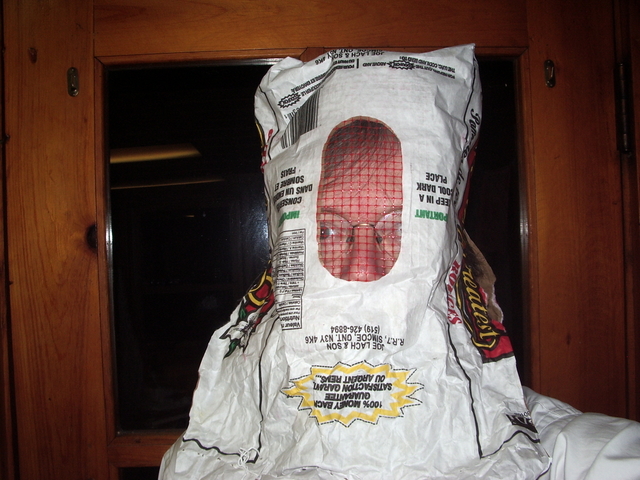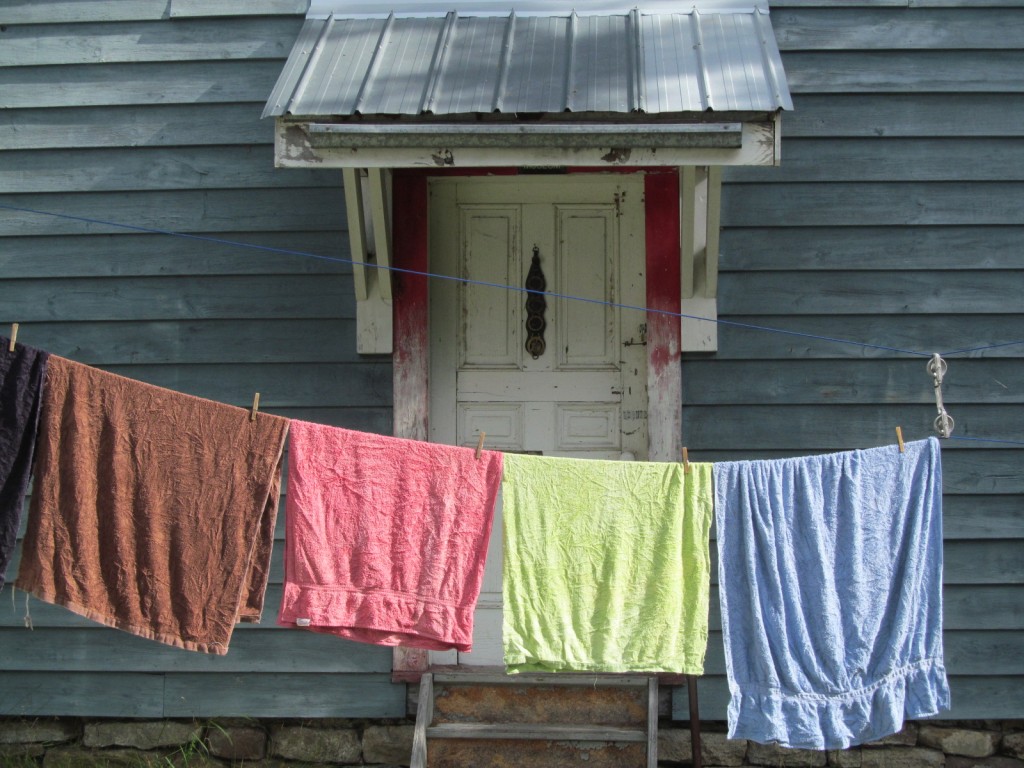Phil Hall is a language-player whose restless mind and tender sensibility makes poems that l like to read over and over. The first time we met up was at the Cow Cafe in downtown Toronto. Someone had put salt in the sugar bowl and I ended up spitting tea down the front of his shirt. He smiled and dabbed at his clothes, the picture of grace when blindsided by an unexpected event. He approaches language and image the same way, welcoming the unanticipated and ushering it inside the poem. Phil Hall has been short-listed for the Griffin Poetry Prize twice and has won the Governor General’s Award and the Trillium Book Award.
— Ann Ireland
Ann Ireland interviews Phil Hall
Ann Ireland: How did you come to poetry?
Phil Hall: Get that goddamn / dog out of here / before I get the shot / gun down (said my father – sounding a lot like Milton) Blue & green / should never be seen / except in the washing machine (said my mother – sounding a lot like Beatrix Potter)
I came to poetry through all of the usual pathetic early tunnels: Wilf Carter and Hal Lone Pine, Kipling and Service, The Song of the Lazy Farmer, greeting cards… I came to poetry backwards, secretly, on an outside track: I would be an actor, because theatre is the art form by which one gets the most immediate response and attention. I was hungry to be told I was OK, and clapping is a big (if fleeting) OK. (Thankfully, writing poetry means that not a soul is in the audience. The inside track and the stadiums are for prose. Hear the novel whizzing by…) I came to poetry – I guess you could say – missionarily – is that a word? The clean & holy parents of school friends sometimes took me along to Baptist Sunday School & Church in Bobcaygeon. Here I heard and sang hymns devoid of melody but rich with long dark tones, the foot pedals pumping on the organ. That chastising drone got into me, I guess – along with the bag-pipes at Orange Lodge parades… Between Milton & Potter: half mighty condemnation / half little animal jingles – I sing.
AI: What does living in nature bring you?
PH: I grew up on farms, but was allergic to everything: hay, ragweed, goldenrod, dust, horses, dogs, cats, blue & green molds…When it grew cold, and those spores weren’t in the air, I got asthma, bronchitis, skin rashes…A dead deer was hanging in the woodshed, dripping – I wouldn’t eat meat. What the hell is wrong with him! Fortunately, books have in them none of the things I am allergic to – except as referents. Books saved me. And peanut butter. I am allergic to rural life, I guess…or ultimately, I am allergic to Ontario. But I have grown out of the asthma, have never smoked so my lungs are clear, can avoid horses & pets & dust & weeds, mostly. And living back in the country, in nature, now, I feel at home – with my aversions. I am writing with Blake’s rural pen, or trying to. I have a little garden, even. The poems eat the leaves off my bean plants.
AI: You burrow at words from the inside-out: I will write a poem again today / it will make no sense // my claver will clawhammer the bars of the word barbaric // sense can be a gag order / silence can be made to sound civilized & free. This feels like a statement of poetic intent. Care to comment?
PH: If we don’t work with words from the inside-out, we are using them as they have been sold to us, cheaply. A poem will then be no more than a Cabbage Patch Frankenstein composed of imitative sound-bits. Poem as soma – in the Huxley sense of a pacifier from the State. Coke. Against this – we may try to honour the historical and sonorously complex revolt against propriety that is each word in truth. Also, to write this way makes me laugh, and is clarifying. I have come late to the pondering of words, late to letter-rumination. Neither Milton or Potter care-took language in this way, contemplating words as objects, designs, sounds, shapes. (In other ways, they did.) Susan Howe, bp Nichol and Robert Duncan are my Virgils in this. But let me tell what I know about these lines you quote…Claver – in Scots means gossip or jibber-jabber. Clawhammer – is a style of banjo strumming, as you know. And you have seen already that the word barbaric has two bars in it. My kind of talk in a poem will strum the two bars in a word like barbaric, acknowledging it visually as well as referentially. Making sense turns out to be very limiting. There is more to be said than — Then she said…And don’t ever think that silence is proper (it is wild). Or that by saying nothing you can remain free. If you don’t write the poem as a full invite to all of the potential barbarism its words embody, your voice is being muzzled, tamed, and eventually killed by…what…education? Morality? As Clark Blaise (another of my heroes) says of the short story: literary justice is at war with morality. This applies to poems too. How would Gertrude Stein or James Joyce write of having been sexually abused as a kid? There are rigorous savannahs of possibility still.
AI: What goes on between spoken words and words on the page?
PH: One of the most common mistakes people make when giving poetry readings, is that they proceed as if the poem – as written – were sacred. It isn’t. When shared aloud, the poem is a non-page creature. Listeners deserve to be entertained. Not preached to, or taught. And certainly not regaled by sly or hip examples of the poet’s sensitivity. For me, this involves composing a reading by pasting together various sections & stanzas of poems from throughout a whole book. I often will tear a book apart, then cut & paste. Making a new thing to read…This turns a box of fossils into sea life again. And listeners are grateful for the iconoclasm.
AI: Sound is dug into the soil of your poetry, so I’m assuming that music is important to you. What do you listen to? Do you listen while writing?
PH: I listen to jazz. Oscar Pettiford, Charlie Mingus, Roland Kirk, David Murray, Jerry Gonzalez & the Fort Apache Band…Horns & bass full-tilt. Sometimes I can write while inside that harsh wall of sound, for it blocks out the constant nitter-natter, and is oddly calming. I listen to early Zydeco and The New Lost City Ramblers. I listen to a lot of fiddle tunes: Jarvis Benoit, Wade Fuge… I have been trying to get the fiddle tunes inside me – to replace the organs & hymns. I’ll keep the bag-pipes.
AI: Do you read poetry in translation? Care to comment on translation in poetry?
PH: I am ashamed to say I use only one language, but what poverty of word there would be without translation! When I read in translation, I know I am looking down through water at cities I can’t walk around in, but I am voracious for wavering glimpses of those foreign cities. Many of my masters are non-English poets: Vallejo & Jimenez, Elytis & Ritsos, Mandelstam & Tsvetayeva, Char & Césaire, Brossard & Pato…Many of what we consider great English poems are in imitation of models from other languages. And what presumption to assume that one language – ours – can always be where the best writing is…Shelley said that to translate a poem was to boil a tulip. I prefer boiled tulip to no tulip at all. At worst, I get that shimmering recognition of something deep in the water; at best, there are translators and trans-translators who give us luminous furtherances of poems…new poems built in border-crossing forms…
AI: Ah research / now there’s the ear’s coffin – This is my favourite line because, like so much of your work, it makes perfect sense although I couldn’t tell you quite what, or I’d get tangled if I tried. It’s also funny. There’s that research and that ear – and the ear is within the research as if tucked into a coffin!
PH: You’ve got it – visually, the word research enacts all of what I’m saying. A pet peeve of mine: the popularity of researching a subject and then writing poems based on that information, the popularity of young poets getting Phds. Too much research, too much information, kills the ear’s ability to hear music. For example, look at the Augustan poets, Dryden & some of his lesser contemporaries. They were solid, pragmatic versifiers, and translators, mostly on classical themes. Designed purely for instruction…reasoned into truth. Lectures & fables cut into heroic couplets. Dryden was like (later) Darwin with a metronome. Dull stale stuff. I prefer, though it sounds flaky in these reactionary times, the ephemeral scatter of Mallarmé. Or I like what Philip Levine says – about actually avoiding learning to do many things – while waiting for the voice to enter him. Not inspiration – but certainly there is more than enough to know about these complex interlocking mysteries of personhood & language – without having to mummify your ear in some archives…There are exceptions, but generally – a book of poetry about something gives me the heeby-jeebies.
AI: I’ll stop there. What the heck is Plevna?
PH: Plevna is a town near here, in the Ottawa Valley. I’ve used as titles for a number of poems in this new book the odd names of nearby towns: Tweed, Poonamalie, Ubdegrove, etc. These poems aren’t about those towns, I just like the sounds of the place-names. And who knows, maybe I have represented my place and mind – by invoking the map of sounds I live within…Who wouldn’t want to call a poem – Oompah!
— Ann Ireland & Phil Hall
Three poems from The Small Nouns Crying Faith (BookThug, 2013)
SPACE
Tweed
..The chewed-corn gaff of the mullein
its tall standard rising behind the wood-pile
..(between the wood-pile & the woods)
seems yellower as the morning darkens
..& the maples gather darkness into themselves
& clouds combine as overcast moil
..& the highest poplars tell of what’s to come
throwing their paper bangles up / letting loose
.[their crepe-ribbon noise (braided loops
being pulled down after the party
..that was sleep)[**]such blinkered comfort to write like this
the supposedly-tender anthropomorphic wit
[.of witness that is really a hiding-out
under stupid traditions[**]while the ramps narrow
[.in the tock yards
it is going to do a whole lot more than rain
/
Greenbush
.[I am away[**]up side-roads[**]into another attempt
at local song[**]have begun to see how to possibly fix[**]again
.[an obscure entry or warped fragment[**]its pulse taken at word
crossings-out[**]circles with arrows[**]crossed-out arrows
[.I am lost[**]my only anchor / dither[**]dither as dubious power
I have sold my children to the zero & the one[**]& complete sets
[.of My Book House to the fox[**]to Fox[**]to Captain Fox
I drink only Adam’s Ale[**]have no one to read to but yellow-jackets
[.when I sit still[**]when I try to be clear & silent[**]I go & & & &
my ear at some hive[**]listening to flight thicken
/
The Access Route
[.There were coy-wolves howling in our woods last night
what is rarer & rarer is an un-surveilled common
[.when it was coming dawn out[**]enough grey-blue[**]the lake grey-blue
I looked out to see the thermometer
[.there were riot police around the cabin
leaning hard against the logs[**]staring straight ahead[**]locked eyes
[.on point with the new chinking
I tapped the window[**]but they didn’t acknowledge
[.they aren’t supposed to I guess[**]the weather continues
& I am the same age I’ve always been[**]am trying
[.not to talk about the weather or my age
for instance I didn’t know hallowed or hollowed
[.was a choice[**]I got told by example something different
victims convinced of their own goodness
[.& up to despicable distractions[**]these were my people
so I chose hollowed by scar[**]when I could have had hallowed
[.which is my initial h plus allowed
now I’ve changed my thinking on this[**]I allow that a hole is for echo not ache
[.bless me 26 times[**]that I may be finally not the point
but the pointer[**]sheep & citizens beware
/
Two sections from the poem sequence X, published in a deluxe special edition of 100 copies by Thee Hellbox Press of Kingston, 2013
[.My posture[**]crumbling[**]says its word
quick-ache-to-sternum-slump
[.but the little sweet Tommy Sweets
grown off of one last tree[**]beside the furthest stile
[.up Devitt’s Settlement[**]scrub cedar[**]mullein[**]purple thistle
are down[**]all down[**]derry-down
[.warty-yellow in the unscythed timothy
my posture says I never went there[**]when I could[**]& can’t now
[.but I did[**]always did[**]& am
/
§
/
[.Few poems worth knowing
worth suspect[**]knowing suspect[**]/[**]few suspect
[.seeing double[**]hearing less out of one ear
to have had to be 60 to say in a poem the abuser’s name
].is this success or failure[**]both[**]neither
my tongue’s baloney-smell[**]articulating adios
— Phil Hall
————————–
 Phil Hall is the 2011 winner of the Governor General’s Literary Award for Poetry in English, for Killdeer, published by BookThug. His is also the 2012 winner of Ontario’s Trillium Book Award for Killdeer. This book of essay-poems also won an Alcuin Design Award, & was nominated for the Griffin Poetry Prize. Previously,Trouble Sleeping (2001) was nominated for the Governor General’s Award; and An Oak Hunch (2005) was nominated for the Griffin Poetry Prize. Among his many titles are also: Old Enemy Juice (1988), Hearthedral—A Folk-Hermetic (1996), White Porcupine (2007), & The Little Seamstress (2010). In the early 80s, Phil was a member of the Vancouver Industrial Writers’ Union, the Vancouver Men Against Rape Collective, & the Starvation Army Band. In the early 90s he was Literary Editor at This Magazine. He is a graduate of the University of Windsor, & has taught writing & literature at York University, Ryerson University, Seneca College, George Brown College, & elsewhere; currently, he offers a manuscript mentoring service for the Toronto New School of Writing. In 2007, Phil & his wife, Ann, walked the Camino de Santiago de Compostela in Spain. He has been poet-in-residence at Sage Hill Writing Experience (Saskatchewan), The Pierre Berton House (Dawson City, Yukon), & elsewhere. In 2012, he was writer-in-residence at Queens University in Kingston. He plays clawhammer banjo, is a member of the Writers’ Union of Canada, & lives near Perth, Ontario.
Phil Hall is the 2011 winner of the Governor General’s Literary Award for Poetry in English, for Killdeer, published by BookThug. His is also the 2012 winner of Ontario’s Trillium Book Award for Killdeer. This book of essay-poems also won an Alcuin Design Award, & was nominated for the Griffin Poetry Prize. Previously,Trouble Sleeping (2001) was nominated for the Governor General’s Award; and An Oak Hunch (2005) was nominated for the Griffin Poetry Prize. Among his many titles are also: Old Enemy Juice (1988), Hearthedral—A Folk-Hermetic (1996), White Porcupine (2007), & The Little Seamstress (2010). In the early 80s, Phil was a member of the Vancouver Industrial Writers’ Union, the Vancouver Men Against Rape Collective, & the Starvation Army Band. In the early 90s he was Literary Editor at This Magazine. He is a graduate of the University of Windsor, & has taught writing & literature at York University, Ryerson University, Seneca College, George Brown College, & elsewhere; currently, he offers a manuscript mentoring service for the Toronto New School of Writing. In 2007, Phil & his wife, Ann, walked the Camino de Santiago de Compostela in Spain. He has been poet-in-residence at Sage Hill Writing Experience (Saskatchewan), The Pierre Berton House (Dawson City, Yukon), & elsewhere. In 2012, he was writer-in-residence at Queens University in Kingston. He plays clawhammer banjo, is a member of the Writers’ Union of Canada, & lives near Perth, Ontario.

